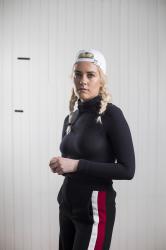Before man simultaneously took one small step and one giant leap, more than 30 astronauts travelled to Iceland to train for the unique challenges they might face on a lunar walk. It was this unique and oft-forgotten piece of history that inspired Bristol-based photographer Matthew Broadhead to cross the Atlantic for his new exhibition, ‘Space for Humans: The Moon on Earth’ at the Reykjavík Museum of Photography.
One Google search term
“I had specific criterium that I wanted in a new project. I was interested in astronomy and geology and I wanted something fresh,” Matthew relays. He talks in a point-by-point manner, stoically, almost like he’s giving a presentation. “I thought maybe I should be a bit ambitious so I literally did a search term on Google—‘astronomy geology Iceland’—and one of the first things that came up was the Exploration Museum in Húsavík.”
Run by astronaut enthusiast Örlygur Hnefill Örlygsson, the Exploration Museum is one of Iceland’s most peculiar treasures—a gallery devoted to photographs and artefacts from the 1965 Apollo geology field trip in Iceland. The site instantly fascinated Matthew, who subsequently teamed up with Örlygur to plan a trek following the trail of the cosmonauts.
Mother Earth
Upon arrival, Iceland’s otherworldly exterior and its history in the space race instantly captivated the photographer, and also made him reflect on his own relationship with the pale blue dot. “There was this particular emphasis that our own planet isn’t fascinating enough and space exploration maybe was setting a precedent for forgetting about our own planet a little,” he explains. “Like, oh we found some other habitable planet so we’re forgetting our own. I felt really strongly about Earth being Mother Earth.”
To relay these emotions, Matthew endeavoured to capture each component of the landscape individually. “By isolating certain aspects of a landscape, you can imagine it as the moon or as an analogue to a planet like Mars,” he explains. “So there’s a romantic, literary aspect as well.”
1960s to today
The exhibit is small, with but a few photos peppering the walls, contrasting sharply with each other. For example, on one wall, a portrait of Örlygur’s famous Apollo 11 spacesuit hangs sandwiched between the desolate Grjótagjá lava cave and bustling Krafla Geothermal Power Plant.
“Every single photo has a story to me,” Matthew says, pointing to the spacesuit portrait. “Örlygur’s spacesuit is emblematic,” he adds softly. He then gestures to the lava cave. “You wouldn’t be able to tell because there aren’t any astronauts in this picture, but I saw a snapshot from the 1960s, a photograph of astronauts just sitting on this ridge. The first time I came to Iceland I couldn’t find it, but I did the second.”
He pauses, turning to the third in this trio. “This geothermal power station is a slight sidestep from the core concept, but I think I was just in awe of the technology in Iceland and that felt quite relevant to the endeavour to get people into space,” he explains. “So in a way, it fits into the same sequence.” He stops and smiles. “It also looks quite futuristic, right?”
‘Space for Humans: The Moon on Earth’ is open until February 3rd at the Reykjavík Museum Of Photography.
Buy subscriptions, t-shirts and more from our shop right here!


















